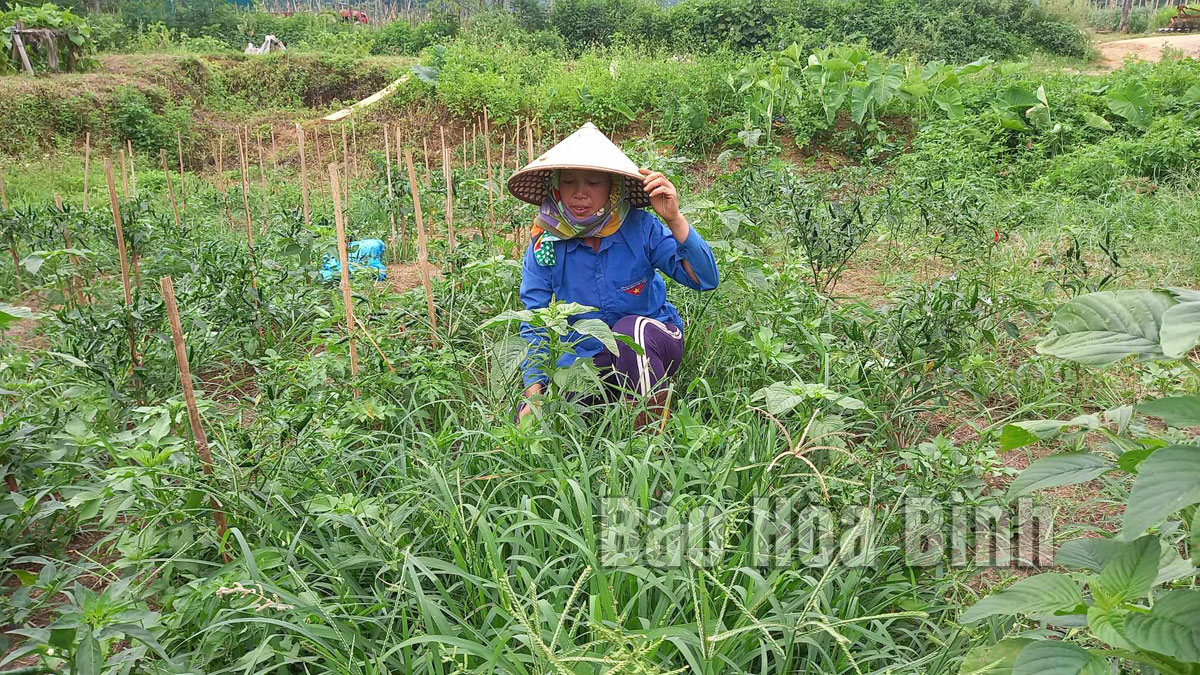
(HBO) – Quyet Chien, a mountainous commune in Tan Lac district and about 17km from the district downtown, has a total area of 2,000 hectares and a rough terrain with high rock mountains.
The long, narrow valley strip with small fields is the commune's major agricultural production hub, which accounts for about 11.4% of the commune’s total natural area, and the rest is mainly forest land with forest and bold rock mountains.
Bieng villagers of Quyet Chien commune in Tan Lac district have switched
inefficient rice farming areas into vegetable farms with higher economic
values.
Provincial Road 440, which crosses the commune, has brought advantages to the
locality in trading activities with neighbouring localities and regions.
Currently, the majority of the 266 households with 1,730 people in Quyet Chien
are living on agriculture.
Over the years, Quyet Chien has focused on implementing national target
programmes, especially the new-style rural area building scheme. It has
strengthened communications to encourage locals to transform the cultivation
structure in a suitable manner. At the same time, the commune has support local
residents in accessing capital from the Vietnam Bank for Social Policy to
invest in economic production.
Bui Van Hoang, a Bieng villager, said that his family has developed 2,500sq.m
of Korean white radish which has generated high economic values.
Hoang’s family is not the only in Quyet Chien to have successfully transformed
their inefficient farms into vegetable farms to provide products to Hanoi and
major cities across the country. Thanks to this solution, many have got out of
poverty. The average per capita income of the commune has reached 36.5 million
VND (1,509 USD). As a result, the rate of poor households in the locality has
been reduced to 18.3%.
Dinh Cong Khoa, Chairman of the provincial People’s Committee, said that the
commune is implementing three national target programmes, including the one on
boosting socio-economic growth in the ethnic minority-inhabited and mountainous
areas in the 2021-2030 period. It have covered all aspects of the social life,
creating positive impacts on these areas.
After two years of implementation, the programme has received positive response
from local residents, contributing to optimising potential and advantages of
the locality, boosting economic development, ensuring social welfare, improving
people’s incomes, and maintaining political stability, social order and safety
in the locality.
The Standing Board of the Hoa Binh provincial Party Committee has agreed in principle on a proposal by the Standing Board of the Party Committee of Hoa Binh city to gather feedback on the city’s 1:2000 zoning plan, which forms part of its broader urban development strategy.
Hoa Binh province has made notable progress in public administration reform and digital government development, with the satisfaction index among citizens and businesses reaching over 84%, according to recent government evaluations.
Thanks to great efforts by local authorities in recent times, the governance and public administration performance of Mai Chau district has been significantly improved.
In the afternoon of June 6, the Party Committee, the People's Council, the People's Committee and the Fatherland Front of Lac Son district solemnly held a meeting to celebrate the 139th anniversary of the district's founding (1886–2025) and the 79th anniversary of the establishment of the district's Party Committee (1946–2025). There was the attendance of Mr. Bui Van Thang, the Vice Chairman of the Provincial People's Council; Mr. Quach Tat Liem, the Vice Chairman of the Provincial People's Committee; Ms. Dang Bich Ngoc, the Deputy Head of the National Assembly Delegation of the province; as well as the former leaders of the province and district through various periods, who are the natives of the district.
Implementing the Politburo’s Resolution No. 57-NQ/TW on breakthroughs in science – technology, innovation, and digital transformation is a golden opportunity for the northern mountainous province of Hoa Binh to renew growth model, improve competitive edge and shorten digital gap.
Resolution 57-NQ/TW, issued by the Politburo on December 22, 2024, identifies sci-tech, innovation, and digital transformation as strategic breakthroughs to build a developed and prosperous nation. In Hoa Binh province, this spirit is not just a slogan, it’s being put into action through concrete initiatives that form a "new development triangle”: digital citizenship, digital economy, and digital administration.



